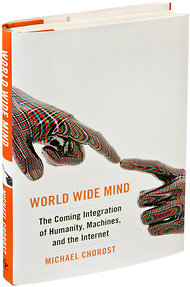Serendip is an independent site partnering with faculty at multiple colleges and universities around the world. Happy exploring!
Mindfulness

Not to jump the gun, but my post this week is intertwined with the book that I'd like to suggest we read, in whole or in part, during the last week of class. I was browsing the New York Times online when I stumbled across a review of a new "book on science" that could not possibly be more relevant to this class.
The review (click on the picture to read the full report) details an excerpt that struck me as particularly relevant to our new section on information and also sounded as if Andy Clark might have written it himself. It depicts police officers who keep each other safe and catch a perpetrator because they can hear each other's thoughts. Even if we struggle to define information, I think we could all agree that the mind is a key player in its transmission and processing. Thinking about the concept of this book connected the technology of cyborg-ism with the role of information for me. The author, Michael Chorost, envisions himself a cyborg, what with his two cochlear implants and having met his wife on an internet dating site, and all. This would be the perfect book with which to close the semester, as it would tie together the different sections of the course and also give us a "moving forward" vision into the future.
One term from the review resonated with me throughout our discussion of Katherine Hayles' text, How We Read. It is psychiatrist John Ratey's coined term, "acquired attention deficit disorder." I personally prefer to read on a computer screen almost because I know that I focus better on the material if it's in print: I enjoy the ability to click around. Thinking about how many of my classmates were guilty of hyper-reading, I wondered if this is a national crisis if only because we are all moving towards this "acquired attention deficit disorder." Someone in class said that it's not that we can't read closely, just that we don't have time. But the brain is a muscle and if we don't exercise certain abilities, they may cease to function, and as an entire generation abandons books and libraries for the laptops, e-readers, and the internet, I think the questions of how we read and process information are more important than ever.




Comments
Thanks for the nice mention
Gee, how nice of you to mention my book to your class. In fact I considered writing about Andy Clark's work, because his work on embodiment and distributed cognition has been so pathbreaking. If your class does choose to read the book, I would
be happy to "visit" via Skype or even in person. Thanks so much and please feel free to contact me.
Regards,
Mike Chorost
Post new comment